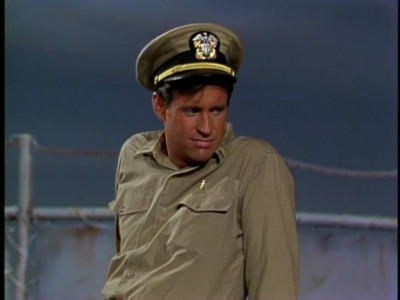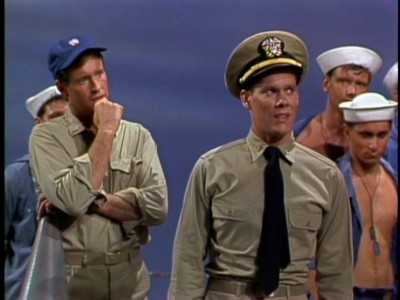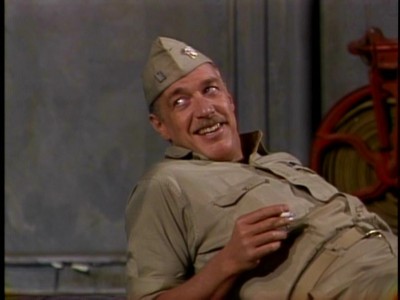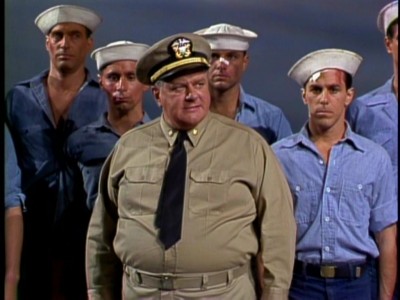| Reviews & Columns |
|
Reviews DVD TV on DVD Blu-ray 4K UHD International DVDs In Theaters Reviews by Studio Video Games Features Collector Series DVDs Easter Egg Database Interviews DVD Talk Radio Feature Articles Columns Anime Talk DVD Savant Horror DVDs The M.O.D. Squad Art House HD Talk Silent DVD
|
DVD Talk Forum |
|
|
| Resources |
|
DVD Price Search Customer Service #'s RCE Info Links |
|
Columns
|
|
|
Mister Roberts (1984)
Acorn Media will release Mister Rogers, the 1984 NBC Live Theatre TV production of the beloved Broadway play and Hollywood film. Starring Robert Hays, Charles Durning, Howard Hesseman, and Kevin Bacon, this tentative version certainly won't displace memories of the 1955 John Ford/Mervyn LeRoy feature film classic starring Henry Fonda, with its videotaped capture of a live studio performance highlighting the inherent flaws in marrying these two entirely different aesthetic experiences. It doesn't help, either, that the performances are largely unremarkable.

Set aboard a backwater Navy cargo ship (the U.S.S. Reluctant) during the final Allied push in the Pacific theatre of operations, Mister Roberts tells the story of Lieutenant JG Doug Roberts (Robert Hays), the chief cargo officer of "The Bucket," as the ship is known by its downtrodden crew. Suffering under the twin pressures of being relegated to back-up support duties (while others fight the war), and having a petulant, vindictive, overly-ambitious, cruel captain (Charles Durning), the crew's only release valve is the constant needling that Mr. Roberts provides at the expense of the Captain. Repeatedly requesting a transfer (in the Navy, all letters of transfer must be submitted, unaltered by a superior officer) and embarrassing the Captain in the process, Mr. Roberts' hatred for the spiteful captain is matched by the captain's disgust for the college-educated Roberts. But the Captain, in a twisted plan to inflict punishment on Mr. Roberts, fully intends to keep him on board, realizing Roberts is a good officer who can help the Captain obtain a promotion to full Commander. Mr. Roberts understands this petty ploy by the Captain, and hates him even more for his refusal to let him fight in a combat zone.
When the ship is suddenly given orders to sail to a tropical island that's used as a popular R&R stop, the crew is ecstatic - none more so than Ensign Frank Pulver (Kevin Bacon), the randy slacker who's had a girl in every port, and who has successfully avoided any meaningful contact with the captain for 14 months. Looking up to Mr. Roberts as inspiration, Pulver gets as much satisfaction from Roberts' insubordination as the rest of the crew, but his plans to take part, as well, in tormenting the Captain always fizzle out when he loses his nerve. Crazed for shore leave like the rest of the pent-up, bored crew, what Pulver and the men don't realize is that their R&R came at a heavy price: the Captain found out that Roberts engineered this side trip, and has blackmailed him into acquiescing to the Captain's will. No more transfer letters, and adherence to strict Navy regulations - including all of the Captain's petty orders that demoralize the crew - and the men can have shore leave. Mr. Roberts agrees, and the men turn on him; everyone, that is, except Doc (Howard Hesseman), the ship's laconic, cynical, always partially soused physician. He knows what Doug did for the men, and he understands the gravity of the situation when Doug decides, despite the Captain's orders, to put in his final letter for transfer.
SPOILERS ALERT!

I know at one time the play Mister Roberts was a sure-fire standard for high schools, colleges, local reps and touring companies, an American theatre classic that never seemed to go out of style (where it stands today I don't know). Originally performed on Broadway in 1948, the Thomas Heggen/Joshua Logan adaptation of Heggen's 1946 novel was a sensation, running for over a 1,000 performances, and winning the Tony Award for Best Play and for its star, Henry Fonda. A 1955 feature film version, marked by some behind-the-scenes drama (Fonda didn't get along with original director John Ford, so Mervyn LeRoy took over, with Josh Logan also shooting some uncredited scenes), was equally popular at the box office (it was Warner Bros.' biggest film that year). Ten years later, a one-shot TV series of Mister Roberts was unsuccessfully aired on NBC, who would, 19 years later, telecast this live studio version of the stage play as part of the network's infrequent NBC Live Theatre series of special events. Despite the hype of recent forays into live TV drama by George Clooney ("Not since the 'Golden Age of Television'...."), NBC had in fact, in the 1980s, continued to broadcast this type of drama, with plays like The Oldest Living Graduate (1980) and All the Way Home (1981) showing up at odd moments on the NBC schedule. This particular version of Mister Roberts showed up during what was perhaps NBC's most embarrassing season (1983-1984), when not one of their new series were picked up for a sophomore season.
I have no recollection of this particular production; I'm sure that if I did see it advertised back then on Monday night, March 19, 1984, I can bet I looked elsewhere for something to watch (although, tuning into alternate Monday night junk like That's Incredible! and Scarecrow and Mrs. King was probably not an option, either). Watching Mister Roberts on DVD, two major problems immediately presented themselves: watching filmed plays is dreadful, and this particular production, in and of itself, was at best, unremarkable. I've written before about filmed plays, and I've yet to see one that does justice to either form of drama. And Mister Roberts is no different. The beauty of live theatre is that it's "live." You can see the actors in a three-dimensional environment, and you can feel their presence up on the stage. Actually seeing and hearing an actor perform is totally unlike seeing an actor perform on screen, and there's an electricity that comes from such an encounter that doesn't translate in exactly the same way on film. As well, there's a complicit melding of audience and performer in a stage play that creates its own atmosphere of expectation and excitement, with one feeding off the other to create a rolling, building sense of anticipation and involvement. All of that is utterly deflated when you actually "film" a play. It's "canned," so to speak, and thus deadened.
As well, all the unique merits of film not to be found when watching a play, are straitjacketed by the limitations of capturing a live performance. No matter how many times you cut to a close-up or back up for a full shot, the camera is essentially locked down to capture a play. It becomes a recorder, not an active, artistic tool, deadening as well all of its possibilities. And so it is with the recording of Mister Roberts. Medium to full shots alternate without much apparent reason, while a close-up is thrown in for good measure, while we wonder what's happening to other characters we hear off-frame, but don't see. It's a frustrating experience all the way around, and a serious compromise to both forms of drama.

Both of which wouldn't have mattered as much if the production here was at a level where we could have forgotten the seriously flawed presentation. But unfortunately, the direction of the piece, and the performances captured, fail to strike much of a spark. Directed by Tony Award-winning director Melvin Bernhardt, the pacing is glacial for this comedy. Nobody has ever described Mister Roberts as a knock-about farce, but cripes, at least let it move from scene to scene, and character to character. Everything here is so hesitant, with a tone that suggests everybody was slowing down, terrified of making a mistake on "live TV." Too bad someone didn't have the guts to go the opposite way, and loosen things up to the point where the audience might think anything could happen - the way most audiences experience real stage plays.
The performances suffer, too, from not only this cautious approach, but also plain miscasting. Durning is fine as the malevolent Captain - although he can't hold a candle to Cagney's indelible, hilarious/nasty performance. He probably comes off best here, with Hesseman coming in a marginal second. Hesseman seems to think that the Doc character can be fobbed off onto his notable turn as Dr. Johnny Fever from WKRP in Cincinnati. It's a lazy performance, one you seen Hesseman give time and time again. Kevin Bacon, inexplicably making Pulver either too dense to be believable or hyperactive to the point of a Ritalin drip, can't seem to get a handle on this deceptively simple character, thus robbing the play of a critical context in relation to the Roberts character.
And most distressingly, the Roberts character is woefully enacted by the slight, almost totally ineffectual Robert Hays. Certainly best known for his hilariously straight-faced turn in Airplane!, Hays has almost none of the qualities needed to enact Roberts effectively. He's not quietly commanding to the crew; he's not morally outraged by the Captain's sick mind; he's not devilishly humored and amused by the catting-around Pulver, and he's not technically adept enough to suggest all the swirling emotions that envelope the Roberts character and drive him to want to engage in combat with the Japanese. When Bacon has his big moment of reading the letter announcing Roberts' death due to a kamikaze attack, the audience is non-plused. Bacon's inexpressive stare doesn't convey the heartbreak of the moment, and we never connected with Hays' Roberts on any kind of emotional level to truly miss him. What plays as deeply tragic in the film (and I would assume in top-notch professional stage productions, also), comes off as trite and facile here. This is college-level dramatics, at best - and a minor-level college, at that.

The DVD:
The Video:
The big surprise here with Acorn Media's Mister Roberts is the video transfer. When I realized this was the 1984 video version of the play, I had my doubts as to what the actual image would look like, but apparently, someone must have had access to the original master tape here, because the full-screen, 1.33:1 transfer looks absolutely flawless. I was frankly shocked at how clear and crisp the image was (even on a big monitor), and how saturated the colors were. This looks like it could have been taped today, not 19 years ago.
The Audio:
The Dolby Digital English mono audio track is adequate for this kind of presentation, with the dialogue heard cleanly throughout. Any fluctuations in the levels obviously stem from the original recording conditions. There are no subtitles or close-captions.
The Extras:
There's a very brief text rundown of the history of the book, play and movie, along with some brief text filmographies for the stars (who even reads these filmographies anymore?).
Final Thoughts:
Amateur night at the local rep. It's bad enough that this is a videotaped "capture" of a live production of Mister Roberts (utterly draining the life out both the theatrical and film experiences), but did the production itself have to be so listless and frankly, inept? Caution and tentativeness rule here, and the central performance by Robert Hays is woefully inadequate to the demands of the character. I suppose if you're a "live TV" fanatic, you might rent Mister Roberts, but everyone else may safely skip it and rent the 1955 film version (or see it on the boards).
Paul Mavis is an internationally published film and television historian, a member of the Online Film Critics Society, and the author of The Espionage Filmography.


|
| Popular Reviews |
| Sponsored Links |
|
|
| Sponsored Links |
|
|
| Release List | Reviews | Shop | Newsletter | Forum | DVD Giveaways | Blu-Ray | Advertise |
|
Copyright 2024 DVDTalk.com All Rights Reserved. Legal Info, Privacy Policy, Terms of Use,
Manage Preferences,
Your Privacy Choices | |||||||














